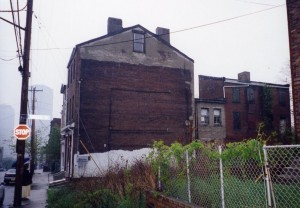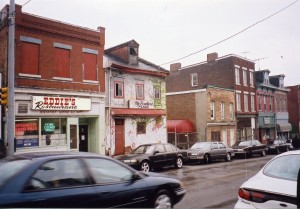#108 – Dick Bernard: August Wilson's Radio Golf
Last night a friend invited us to attend a performance of August Wilson’s last play, Radio Golf, at St. Paul’s Penumbra Theatre #mce_temp_url#. I have been an off and on patron of Penumbra since 1985, and with Radio Golf have now seen eight of the ten plays of acclaimed playwright August Wilson’s “20th Century Cycle”. (The ten plays are listed at the end of this post. Mr. Wilson, who passed away six months after the premiere of Radio Golf in 2005, earned international acclaim, including, among numerous awards, two Pulitzer Prizes. He considered Penumbra his “home” theatre – where his writing was encouraged and his work was first performed in 1977. He was born and grew up in Pittsburgh PA.)
Radio Golf has its final performances this coming weekend. It is well worth the nearly three hours of intense (and sometimes humorous) performance by the stellar cast of four men and one woman.
Wilson’s 20th century cycle traces the African-American experience in the U.S., decade by decade.
Radio Golf takes on the 1990s. The plays title makes a whole lot of sense once the play is experienced in person.
Radio Golf is set in Pittsburgh’s Hill District, where August Wilson grew up.
Boiled to its essence, I saw Wilson portraying the tensions within the African-American community as a traditional sense of community competes with the contemporary American view of money and its ability to both control and corrupt. The unlikely heroes and villains are all African-American. At issue is Big Money coming in to redevelop a poor neighborhood. Money interests trump Community interests.
The plays focus becomes a ramshackle, abandoned, house which we never see, but which comes alive as somebody’s home.
In this play, in my view, Community (with a capital C) is winning as the play ends. The power structure has all the weapons and the means to do what it wants, but when all is said and done, a unified community puts the big-shots in their place. The play ends without revealing a final resolution, and one hopes that the community can keep its focus.
I went to the play knowing nothing about what I was going to see.
For me, Radio Golf came alive in a unique way, since in April, 1998, my daughter and I were given a priceless tour of August Wilson’s growing up neighborhood in the Hill District of Pittsburgh. Our guide for several hours was his sister Freda, and what a wonderful guide she was.
We saw, and indeed went inside, the tiny, empty and deteriorating flat where August Wilson grew up; the restaurant where he did his first serious writing (he loved to write in restaurants); and all of the neighborhood places and many people familiar to him, many of which appear as characters in his work. Never in my wildest dreams back then would I have realized that eleven years later I would see his 1990s view of his home neighborhood and its future in Radio Golf.
I have many photos of those several hours in The Hill District in 1998, and reams more of memories of what we saw. Below are a couple of the photos.
See Radio Golf if you can; it helps bring a small amount of hope in a hopeless time.

August Wilson boyhood home was in building at right in the photo, 1727 Bedford Avenue. Entrance was from back side of the building. Note in background the skyline of downtown Pittsburgh, a few blocks down the hill.

Eddie's Restaurant where August Wilson began his writing career. Dick Bernard, April, 1998
August Wilson’s 20th Century Cycle
1900s – Gem of the Ocean
1910s – Joe Turner’s Come and Gone
1920s – Ma Rainey’s Black Bottom
1930s – The Piano Lesson (Pulitzer prize 1990)
1940s – Seven Guitars
1950s – Fences (Pulitzer Prize 1987)
1960s – Two Trains Running
1970s – Jitney
1980s – King Hedley II
1990s – Radio Golf
(1727 Bedford Avenue is at #mce_temp_url#)
UPDATE October 18, 2009 4:10 p.m.
I used the miracle of mapquest and whitepages to nose around pieces of August Wilson’s neighborhood which I remember from 1998. The aerial photo of the neighborhood reveals at least the possibility that the flat in which he grew up may still exist; Eddie’s is no longer listed as a business; it appears that his school across from the Mellon Center downtown has been taken down, and in general the area looks redeveloped. One can celebrate or lament what some would see as progress; others as destruction. Perhaps there is an element of both….
